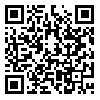BibTeX | RIS | EndNote | Medlars | ProCite | Reference Manager | RefWorks
Send citation to:
URL: http://journal.zums.ac.ir/article-1-3485-en.html
2- Faculty of Paramedical, Sabzevar University of Medical Sciences, Sabzevar, Iran. ,
3- Student Research Committee, Sabzevar University of Medical Sciences, Sabzevar, Iran
Background and Objective: Cancer-related fatigue is one of the most common side effects of breast cancer treatments. Humor therapy has a special role in alternative and complementary medicine. The aim of this study was to determine the effect of humor therapy on fatigue severity and quality of life in breast cancer patients undergoing external radiation therapy.
Materials and Methods: This study was a clinical trial which was carried out on 58 patients with breast cancer receiving radiation therapy (5 weeks) in two groups of experimental and control. Patients in the experimental group attended humor therapy sessions twice a week for one month. Fatigue questionnaires were completed at the end of the first week as the pretest and at the end of following weeks as the posttest. Results were analyzed through statistical methods of repeated measures ANOVA and independent t test in SPSS 17 software.
Results: Comparison of four items of fatigue severity in both groups after humor therapy showed statistically significant differences between treatment and control groups (P=0.001). There was a mild fatigue interfering with normal activities in the humor group and a severe fatigue interfering with making relationship with others and enjoyment of life in the control group. This difference was statistically significant between two groups (P=0.001).
Conclusion: The results of this study suggest that humor can be effective in reducing cancer-related fatigue in breast cancer patients undergoing radiation therapy. Nursing managers are recommended to supplement facilitities for implementation of humor in order to improve the quality of life of cancer patients.
Received: 2016/01/11 | Accepted: 2016/01/11 | Published: 2016/01/11
| Rights and permissions | |
 |
This work is licensed under a Creative Commons Attribution-NonCommercial 4.0 International License. |




